Sarah's Herbal Garden
Liver Detox Tincture
Liver Detox Tincture
Couldn't load pickup availability
2 fl. oz. (56.7 g)
This product can be purchased singularly or as a part of our 3 month Full Detox Protocol! We recommend detoxing the urinary system once per year.
The liver contains a critical filtering system in the body. The liver processes and neutralizes toxins, chemicals, and waste products from the blood. These substances are transformed into less harmful compounds through enzymatic reactions. It produces bile, which helps break down fats and carries waste products and toxins into the digestive system for elimination. The liver metabolizes medications, converting them into forms that can be easily excreted from the body. It converts ammonia, a byproduct of protein metabolism, into urea, which is then excreted through urine. It produces glutathione, a powerful antioxidant that helps neutralize free radicals and protect cells from oxidative damage. The liver stores vitamins and minerals and releases them as needed, ensuring the body has the necessary resources to support detoxification processes. It also helps to maintain stable blood sugar levels by converting excess glucose into glycogen for storage and releasing it when needed.
When waste, toxins, and even dormant pathogens build up in the liver, it affects all body systems. Keeping the liver clean and toned can strengthen the immune system, increase energy, balance hormones, reduce swelling, restore mental clarity, prevent unwanted weight gain, and more!
Toxic buildup in the liver can lead to several health issues and symptoms, reflecting the liver's impaired ability to function properly. Some of the common side effects and conditions associated with toxic buildup in the liver include:
Fatigue: Persistent tiredness and lack of energy can result from the liver's reduced ability to process toxins and metabolize nutrients efficiently.
Jaundice: A yellowing of the skin and eyes occurs when the liver cannot process bilirubin, a waste product of red blood cell breakdown.
Nausea and Vomiting: Accumulation of toxins can cause digestive disturbances, leading to frequent nausea and vomiting.
Abdominal Pain and Swelling: Inflammation and enlargement of the liver can cause pain and swelling in the upper right abdomen.
Dark Urine and Pale Stools: Changes in urine and stool color can indicate problems with bile production and excretion.
Itchy Skin: Bile salts deposited in the skin can cause persistent itching.
Swelling in the Legs and Ankles: Fluid retention due to liver dysfunction can lead to edema in the lower extremities.
Easy Bruising and Bleeding: The liver's reduced ability to produce clotting factors can lead to increased bleeding and bruising.
Cognitive Issues (Hepatic Encephalopathy): Accumulation of toxins like ammonia in the blood can affect brain function, leading to confusion, memory problems, and impaired judgment.
Weak Immune System: Impaired liver function can weaken the immune system, making the body more susceptible to infections.
Hormonal Imbalances: The liver helps regulate hormone levels, and dysfunction can lead to imbalances, causing symptoms like menstrual irregularities or gynecomastia in men.
Liver Cirrhosis: Long-term toxic buildup can cause liver scarring (cirrhosis), leading to severe liver dysfunction and potentially liver failure.
The herbs for this tincture were each chosen for their unique properties to detox and tone the liver!
These statements have not been evaluated by the Food and Drug Administration. This product is not intended to diagnose, treat, cure, or prevent any disease. Consult with healthcare provider if pregnant or breastfeeding, have an underlying health conditions, beginning an herbal supplement for the first time, or are taking other medications.
Share
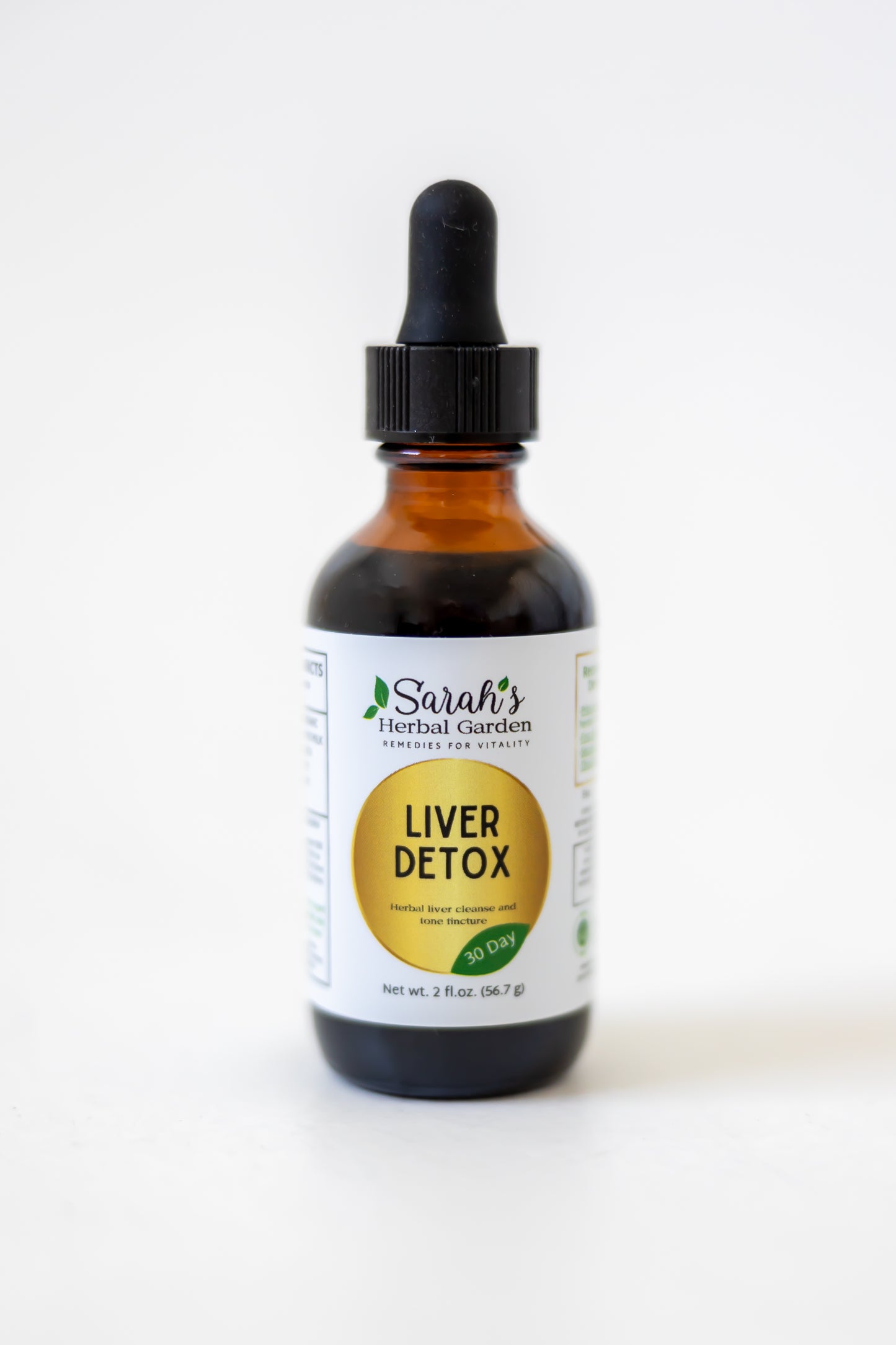
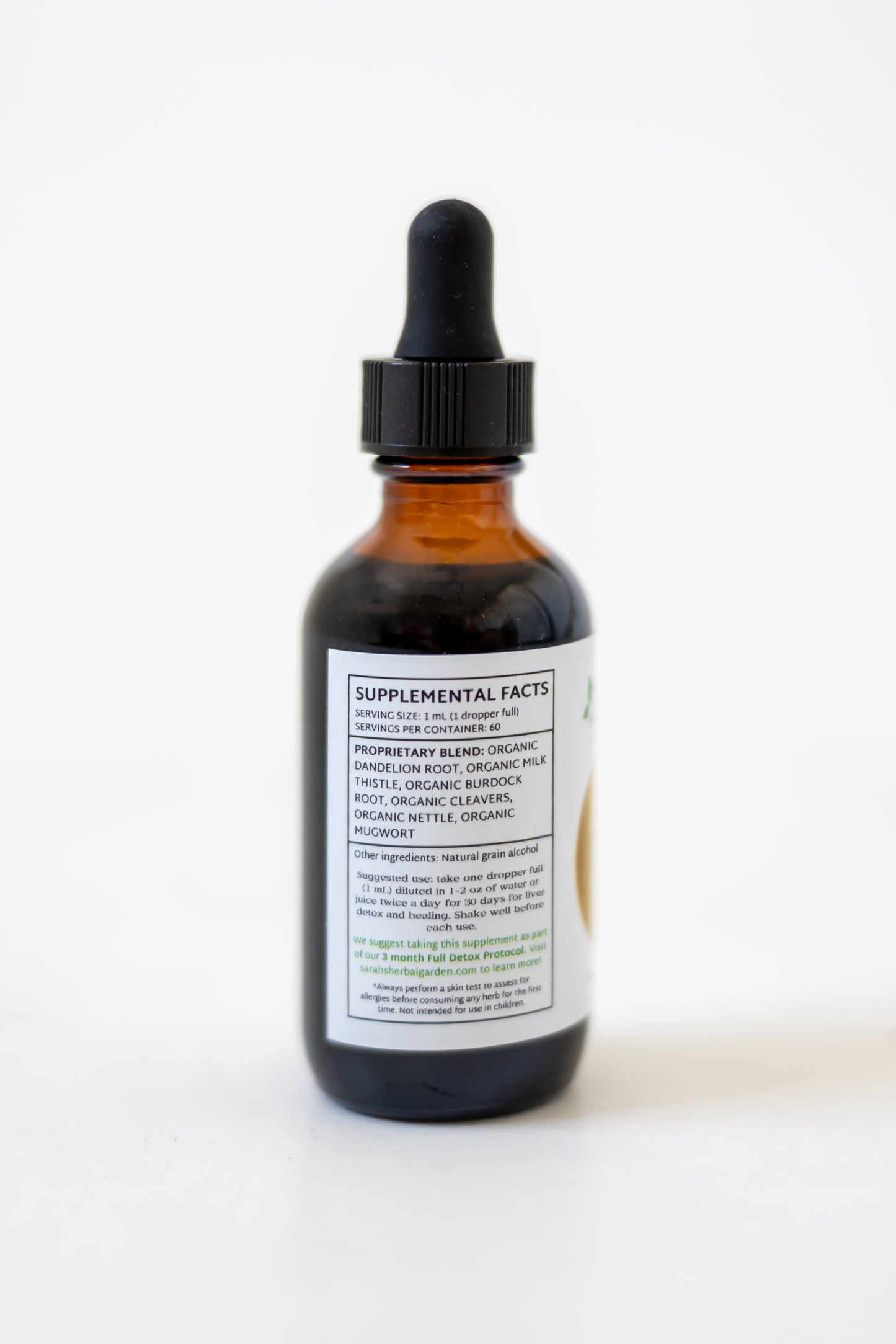
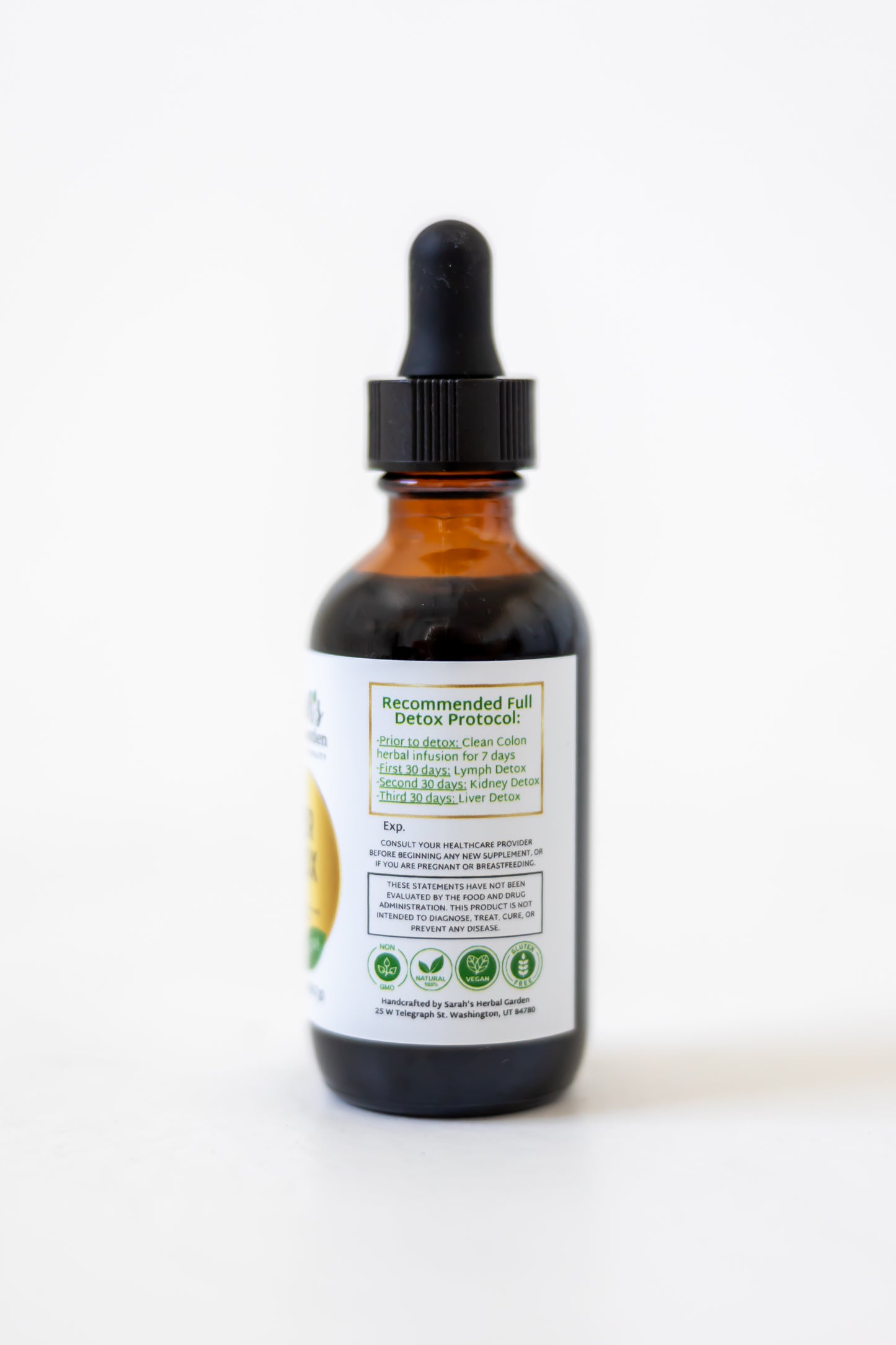
Herbs used in this blend
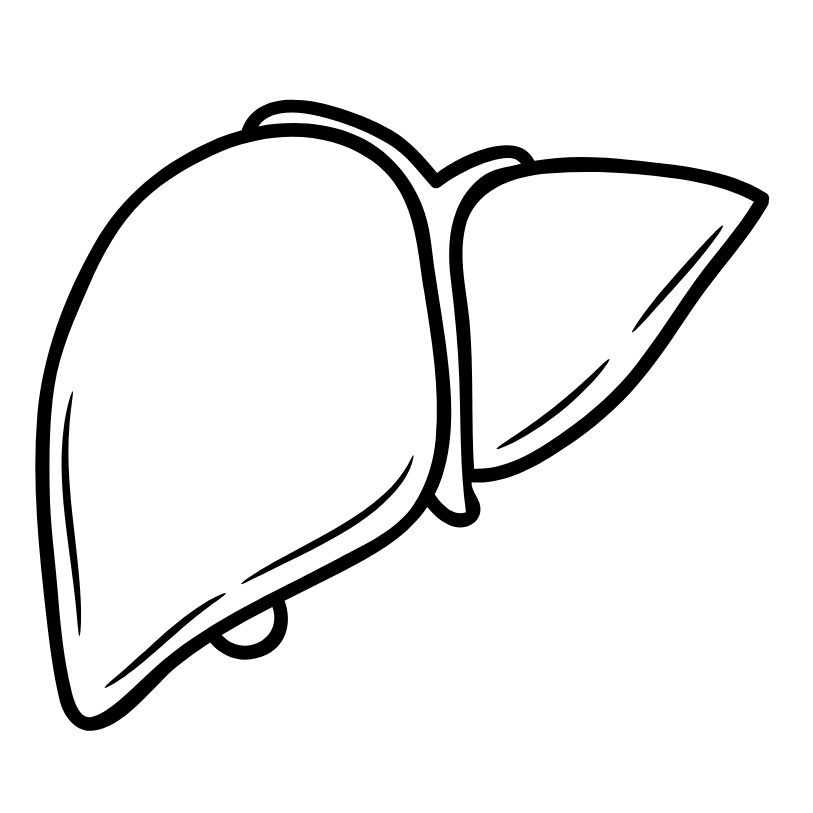
Dandelion Root
Dandelion root (Taraxacum officinale) is widely recognized for its liver-supporting and detoxifying properties. It has been used in traditional medicine for centuries to promote liver health and aid in detoxification. Here’s how dandelion root helps detox the liver:
1. Stimulates Bile Production
- Enhances Liver Function: Dandelion root stimulates the production and flow of bile, a fluid produced by the liver that aids in digestion, particularly the breakdown and absorption of fats. Increased bile production helps the liver efficiently process and eliminate toxins, including those derived from fatty substances. This cleansing action supports overall liver function and promotes detoxification.
2. Diuretic Properties
- Aids in Toxin Elimination: Dandelion root acts as a natural diuretic, increasing urine production. This helps the liver and kidneys work together to remove toxins from the body more efficiently. By promoting the elimination of excess fluids and waste products, dandelion root reduces the liver's workload and supports the detoxification process.
3. Rich in Antioxidants
- Protects Liver Cells from Damage: Dandelion root contains various antioxidants, including flavonoids, vitamin C, and beta-carotene, which protect liver cells from oxidative stress and damage caused by free radicals. These antioxidants help neutralize harmful substances that can accumulate in the liver, reducing the risk of liver damage and supporting overall liver health.
4. Anti-inflammatory Effects
- Reduces Liver Inflammation: Chronic inflammation in the liver can impair its function and lead to conditions like fatty liver disease, hepatitis, or cirrhosis. Dandelion root has anti-inflammatory properties that help reduce inflammation in the liver, promoting healing and improving liver function.
5. Promotes Liver Regeneration
- Supports Liver Tissue Repair: Dandelion root has been shown to support the regeneration of liver tissue. By enhancing the liver's ability to repair itself, dandelion root helps maintain optimal liver function and aids in the recovery from liver-related conditions.
6. Liver Detoxification Support
- Enhances Phase I and II Detoxification: The liver detoxifies harmful substances through two main phases: Phase I and Phase II detoxification. Dandelion root supports both phases by providing nutrients and compounds that enhance the liver's enzymatic processes, helping the liver break down and eliminate toxins more effectively.
7. Improves Digestion
- Aids in Waste Elimination: Dandelion root’s ability to stimulate bile production also supports digestion and the elimination of waste. Improved digestion and waste elimination reduce the toxic load on the liver, allowing it to focus on detoxification processes rather than dealing with undigested food or metabolic waste.
8. Blood Purification
- Reduces the Liver’s Toxin Load: Dandelion root has traditionally been used as a blood purifier. By helping to cleanse the blood of toxins and waste products, it reduces the liver's burden and enhances its ability to filter and detoxify the blood effectively.
9. Prevents Liver Fat Accumulation
- Protects Against Fatty Liver: Dandelion root may help prevent the accumulation of fat in the liver, a condition known as fatty liver disease. By promoting fat metabolism and reducing fat storage in liver cells, dandelion root supports a healthier liver and enhances its detoxification capacity.
Nettle
Nettle (Urtica dioica), commonly known as stinging nettle, is a nutrient-rich herb traditionally used for various health benefits, including detoxification and supporting liver health. Here's how nettle helps detox the liver:
1. Antioxidant Properties
- Protects Liver Cells from Damage: Nettle is rich in antioxidants, including flavonoids, vitamin C, and carotenoids, which help protect liver cells from oxidative stress and damage caused by free radicals. By neutralizing free radicals, nettle reduces the risk of liver damage and supports the liver’s ability to detoxify the body effectively.
2. Anti-inflammatory Effects
- Reduces Liver Inflammation: Chronic inflammation can impair liver function and lead to conditions like fatty liver disease, hepatitis, or cirrhosis. Nettle has potent anti-inflammatory properties that can help reduce inflammation in the liver, promoting healing and improving liver function. By mitigating inflammation, nettle supports the liver’s detoxification processes.
3. Diuretic Properties
- Promotes Toxin Elimination: Nettle acts as a natural diuretic, increasing urine production and helping the body eliminate toxins and waste products through the urinary system. This diuretic effect indirectly supports liver detoxification by reducing the burden on the liver and aiding in the excretion of toxins that the liver processes.
4. Blood Purification
- Supports Overall Detoxification: Nettle has traditionally been used as a blood purifier, meaning it helps cleanse the blood of toxins and waste products. Since the liver is responsible for filtering and detoxifying the blood, nettle’s blood-cleansing properties reduce the toxic load on the liver, allowing it to function more efficiently.
5. Nutrient-Rich Support
- Provides Essential Nutrients for Liver Health: Nettle is rich in vitamins and minerals, such as iron, magnesium, calcium, and potassium, which are essential for overall health and well-being. These nutrients support liver function by ensuring that the liver has the necessary resources to carry out its detoxification processes. For instance, iron is crucial for the production of hemoglobin, which transports oxygen in the blood and supports liver health.
6. Supports Liver Regeneration
- Aids in Liver Tissue Repair: The liver has a remarkable ability to regenerate itself, and nettle can support this process by providing nutrients and reducing inflammation. By promoting the repair and regeneration of liver tissue, nettle helps maintain optimal liver function and supports the liver’s detoxification capacity.
7. Enhances Bile Production
- Supports Digestion and Waste Elimination: Nettle may help stimulate the production of bile, a substance produced by the liver that aids in digestion and the elimination of waste products. Improved bile flow helps the liver process and remove toxins more effectively, supporting overall detoxification.
8. Immune System Support
- Boosts Immunity and Liver Function: Nettle has immune-boosting properties, which can help the liver fight off infections and reduce the risk of liver-related illnesses. A strong immune system supports the liver in its role as a filter for pathogens and toxins, enhancing its detoxification capabilities.
Milk Thistle
Milk thistle (Silybum marianum) is one of the most well-known herbs for liver detoxification and has been used for centuries in traditional medicine to support liver health. The active compound in milk thistle, known as silymarin, is primarily responsible for its liver-protective and detoxifying effects. Here's how milk thistle helps detox the liver:
1. Antioxidant Properties
- Protects Liver Cells from Oxidative Stress: Milk thistle is rich in silymarin, a potent antioxidant that helps protect liver cells (hepatocytes) from damage caused by free radicals and oxidative stress. This protection is crucial because the liver is constantly exposed to toxins and byproducts of metabolism that can cause oxidative damage. By neutralizing these harmful free radicals, milk thistle helps prevent liver cell damage and supports overall liver health.
2. Promotes Liver Cell Regeneration
- Supports Liver Repair and Regrowth: One of the unique properties of silymarin is its ability to promote the regeneration of liver cells. This is particularly important because the liver has the ability to repair itself after injury or damage. Silymarin stimulates protein synthesis in the liver, helping to regenerate damaged liver tissue and maintain healthy liver function. This regenerative effect is especially beneficial for individuals with liver conditions such as hepatitis, cirrhosis, or fatty liver disease.
3. Anti-inflammatory Effects
- Reduces Liver Inflammation: Chronic inflammation in the liver can lead to conditions such as hepatitis, cirrhosis, and liver fibrosis. Silymarin in milk thistle has strong anti-inflammatory properties that help reduce inflammation in the liver, promoting healing and preventing further damage. By reducing inflammation, milk thistle helps to protect the liver and enhance its detoxification capacity.
4. Enhances Detoxification Enzyme Activity
- Supports Phase I and II Detoxification: The liver detoxifies harmful substances through two main phases: Phase I and Phase II detoxification. Silymarin enhances the activity of detoxification enzymes involved in these phases, helping the liver to more efficiently process and eliminate toxins. This includes the breakdown of toxins, drugs, and other harmful substances, making them easier for the body to eliminate.
5. Stabilizes Liver Cell Membranes
- Prevents Toxin Penetration into Liver Cells: Silymarin helps stabilize the membranes of liver cells, making it more difficult for toxins to penetrate and cause damage. This membrane-stabilizing effect is crucial for protecting the liver from the harmful effects of various toxins, including alcohol, environmental pollutants, and medications.
6. Chelation of Heavy Metals
- Helps Remove Heavy Metals from the Liver: Milk thistle has been shown to have chelating properties, meaning it can bind to heavy metals like lead and cadmium and facilitate their removal from the liver. This helps reduce the toxic burden on the liver and supports its detoxification functions.
7. Bile Production and Flow
- Supports Digestion and Detoxification: Milk thistle can stimulate bile production and flow. Bile is essential for the digestion and absorption of fats, and it also plays a key role in the elimination of fat-soluble toxins and waste products. Improved bile flow helps the liver more effectively process and excrete these substances, supporting overall detoxification.
8. Liver Protection from Alcohol and Toxins
- Protects Against Alcohol-Induced Damage: Milk thistle is particularly effective in protecting the liver from damage caused by alcohol and other toxins. Silymarin reduces the oxidative stress and inflammation associated with alcohol consumption and helps prevent the progression of alcohol-related liver diseases.
Burdock Root
Burdock root (Arctium lappa) is a traditional herb known for its powerful detoxifying properties, particularly in supporting liver health. Here's how burdock root helps detox the liver:
1. Blood Purification
- Cleanses the Blood: One of the primary actions of burdock root is its ability to purify the blood. It helps remove toxins and waste products from the bloodstream, which in turn reduces the burden on the liver. Since the liver is responsible for filtering and detoxifying the blood, burdock root's blood-cleansing action supports overall liver function by ensuring that the blood entering the liver is less toxic.
2. Stimulates Bile Production
- Enhances Digestion and Detoxification: Burdock root stimulates the production and flow of bile from the liver and gallbladder. Bile is essential for the digestion and absorption of fats, and it also plays a crucial role in the elimination of fat-soluble toxins. By increasing bile production, burdock root helps the liver process and excrete toxins more efficiently, supporting the body's overall detoxification processes.
3. Antioxidant Properties
- Protects Liver Cells from Damage: Burdock root is rich in antioxidants, such as quercetin, luteolin, and phenolic acids, which protect liver cells from oxidative stress and damage caused by free radicals. By neutralizing these harmful free radicals, burdock root helps prevent liver cell damage and supports the liver's ability to detoxify the body effectively.
4. Anti-inflammatory Effects
- Reduces Liver Inflammation: Chronic inflammation in the liver can lead to conditions such as hepatitis, fatty liver disease, and cirrhosis. Burdock root has anti-inflammatory properties that help reduce inflammation in the liver, promoting healing and improving liver function. By mitigating inflammation, burdock root enhances the liver's detoxification capacity.
5. Diuretic Properties
- Promotes Toxin Elimination: Burdock root acts as a natural diuretic, which means it increases urine production. This helps the body eliminate toxins and waste products through the urinary system, reducing the load on the liver. By promoting the excretion of excess fluids and toxins, burdock root supports the liver's detoxification processes.
6. Supports Liver Regeneration
- Aids in Liver Tissue Repair: Burdock root has been shown to support the regeneration of liver cells. This is particularly important because the liver has the ability to repair itself after injury or damage. By promoting the repair and regeneration of liver tissue, burdock root helps maintain optimal liver function and supports the liver's role in detoxification.
7. Improves Digestion
- Aids in Waste Elimination: Burdock root's ability to stimulate bile flow also supports digestion and the elimination of waste products. Improved digestion reduces the toxic load on the liver, allowing it to focus on detoxification rather than processing undigested food or metabolic waste.
8. Chelation of Heavy Metals
- Helps Remove Heavy Metals from the Liver: Burdock root may assist in the chelation of heavy metals, such as lead, mercury, and cadmium, which can accumulate in the liver and cause damage. By binding to these metals, burdock root helps facilitate their removal from the body, reducing the toxic burden on the liver.
Cleavers
Cleavers (Galium aparine) is a herb traditionally known for its ability to support the lymphatic system, but it also has benefits for liver health and detoxification. Here's how cleavers help detox the liver:
1. Lymphatic System Support
- Reduces Liver Toxin Load: Cleavers are primarily known for their role in supporting the lymphatic system, which is responsible for filtering and transporting waste products and toxins throughout the body. By enhancing lymphatic drainage, cleavers help reduce the overall toxin load that the liver needs to process, indirectly supporting liver detoxification.
2. Diuretic Properties
- Promotes Toxin Elimination: Cleavers have natural diuretic properties, meaning they increase urine production. This helps the body eliminate toxins and waste products through the urinary system more effectively. By promoting the excretion of excess fluids and toxins, cleavers reduce the burden on the liver, supporting its detoxification processes.
3. Anti-inflammatory Effects
- Reduces Liver Inflammation: Cleavers possess anti-inflammatory properties that can help reduce inflammation in various parts of the body, including the liver. Chronic inflammation in the liver can impair its ability to detoxify the body, leading to conditions such as fatty liver disease. By reducing inflammation, cleavers support healthier liver function and enhance the liver’s ability to detoxify.
4. Antioxidant Properties
- Protects Liver Cells from Damage: Cleavers contain antioxidants that help protect liver cells from oxidative stress and damage caused by free radicals. By neutralizing these harmful substances, cleavers help prevent liver cell damage and support the liver’s ability to detoxify the body.
5. Stimulates Bile Flow
- Supports Digestion and Detoxification: Cleavers can help stimulate the production and flow of bile, a substance produced by the liver that is essential for the digestion of fats and the elimination of fat-soluble toxins. Enhanced bile flow aids the liver in processing and excreting toxins more efficiently, supporting overall detoxification.
6. Supports Liver Regeneration
- Aids in Liver Tissue Repair: While not as strongly regenerative as some other herbs like milk thistle, cleavers can support the liver’s natural ability to repair and regenerate itself. By promoting the health and function of liver tissue, cleavers help maintain optimal liver function and assist in detoxification.
7. Blood Purification
- Reduces the Liver’s Detoxification Load: Cleavers have traditionally been used as a blood purifier, helping to cleanse the blood of toxins and waste products. Since the liver is responsible for filtering the blood, the blood-purifying action of cleavers reduces the amount of toxins that the liver needs to process, supporting overall liver health.
Mugwort
Mugwort (Artemisia vulgaris) is a traditional herb with various medicinal uses, including potential benefits for liver detoxification. Although mugwort is more commonly known for its use in digestive health, menstrual regulation, and as a mild sedative, it also possesses properties that can support liver health and detoxification. Here’s how mugwort might help detox the liver:
1. Stimulates Bile Production
- Enhances Digestion and Detoxification: Mugwort is known to stimulate the production and flow of bile from the liver and gallbladder. Bile is crucial for the digestion and absorption of fats and the elimination of fat-soluble toxins. By enhancing bile production, mugwort supports the liver’s ability to process and excrete toxins, aiding in overall detoxification.
2. Supports Digestive Health
- Reduces Liver Load: Mugwort is traditionally used to improve digestion by relieving symptoms like bloating, gas, and indigestion. Improved digestion means that fewer undigested food particles and toxins reach the liver, reducing its workload. A healthier digestive system indirectly supports liver detoxification by preventing the accumulation of toxins that could otherwise burden the liver.
3. Antioxidant Properties
- Protects Liver Cells from Damage: Mugwort contains various antioxidants, such as flavonoids, that help protect liver cells from oxidative stress and damage caused by free radicals. By reducing oxidative damage, mugwort supports the liver's health and enhances its ability to detoxify the body effectively.
4. Anti-inflammatory Effects
- Reduces Liver Inflammation: Mugwort has anti-inflammatory properties that can help reduce inflammation in the liver and other parts of the body. Chronic liver inflammation can impair detoxification processes and lead to conditions such as hepatitis or fatty liver disease. By reducing inflammation, mugwort helps maintain healthy liver function and supports its detoxification capacity.
5. Mild Diuretic Effects
- Promotes Toxin Elimination: Mugwort may have mild diuretic properties, which can help promote the elimination of toxins and waste products through increased urine production. This diuretic effect, although mild, can reduce the overall toxic load on the liver and assist in the detoxification process.
6. Blood Circulation Enhancement
- Supports Liver Function: Mugwort is believed to improve blood circulation. Better circulation ensures that the liver receives an adequate supply of oxygen and nutrients, which are essential for its detoxification functions. Improved blood flow also helps the liver more efficiently filter and remove toxins from the bloodstream.
7. Potential Antimicrobial Properties
- Protects Against Liver Infections: Mugwort has been traditionally used for its antimicrobial properties, which can help protect the liver from infections that might otherwise compromise its detoxification abilities. By preventing infections and reducing microbial load, mugwort supports a healthier liver environment.
Check out our other detox products!
-
Colon, Lymph, Kidney, and Liver Detox
Regular price $90.00 USDRegular priceUnit price / per -
Clean Colon {Herbal Tea Blend for Occasional Constipation}
Regular price $12.00 USDRegular priceUnit price / per -
Lymph Detox Tincture
Regular price $29.00 USDRegular priceUnit price / per -
Kidney Detox Tincture
Regular price $29.00 USDRegular priceUnit price / per
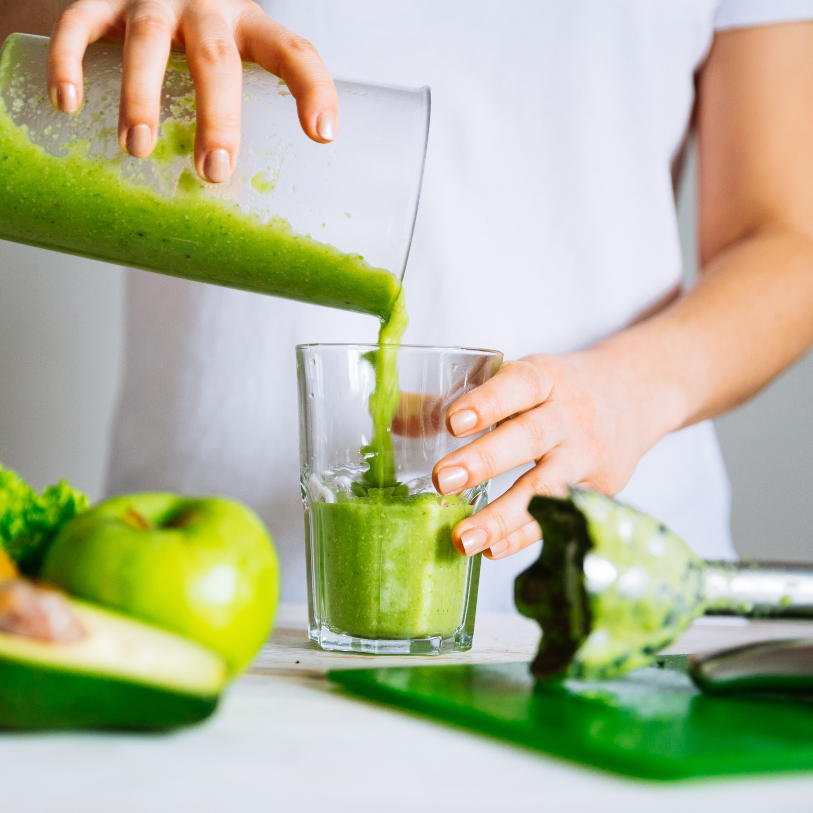
Learn more about detoxing
From ditching toxic beauty and cleaning products, to eliminating processed food and embracing whole, organic food...fully detoxing is a lifestyle commitment!







